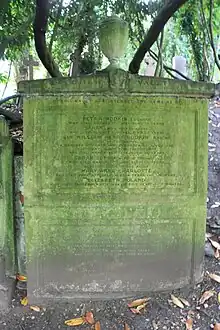William Bodkin (judge)
Sir William Henry Bodkin (5 August 1791[1] – 26 March 1874[2]) was a British barrister and Conservative Party politician who sat in the House of Commons from 1841 to 1847, before becoming a judge.


Early life
Bodkin was the son of Peter Bodkin from Galway and his wife Sarah.[1] His father's family had long connections with County Galway.[3]
He was educated at the Islington Academy and called to the bar in 1826 at Gray's Inn.[1]
Career
Bodkin is described, in his early career, as an auctioneer and house agent. In 1818 he was the leading founder and became honorary secretary of the Society for the Suppression of Mendicity, a position he held until 1830; and from 1921 he acted as the perhaps disproportionately salaried "assistant manager" of the Society's inquiry and relief office, receiving £300 per annum plus bonuses.[lower-alpha 1] The assertion is made that he used the connections afforded by his work with that society, to "launch himself as a barrister".[5][6]
Bodkin initially practised on the Home Circuit, taking mostly criminal cases at the Middlesex, Westminster and Kent Sessions, and in the Central Criminal Court in the Old Bailey.[3] was appointed as a recorder of Dover in 1834.[1]
He was elected at the 1841 general election as a Member of Parliament (MP) for the borough of Rochester in Kent,[7] winning the seat by a margin of only two votes over the Liberal Party candidate Viscount Melgund.[3] Bodkin was defeated at the 1847 general election[8] as a result of his support for the free trade measures introduced by Sir Robert Peel.[1] He did not stand at the 1852 general election,[8] but unsuccessfully contested the borough at a by-election in February 1856.[8]
He was knighted in 1867.[9] He later became a Justice of the Peace (J.P) in Middlesex, and a Deputy Lieutenant of Middlesex,[1] and judge of the Court of Sessions in Middlesex.[1]
He was an active member of the Society of Arts, becoming its vice-president.[1][3] He was president of the Highgate Literary and Scientific Institution and he wrote several pamphlets on the English Poor Laws.[1][3]
Bodkin died aged 82 on 26 March 1874,[2] after a long and painful illness.[3] He was buried in the family grave at Highgate Cemetery[10]
Personal life
Bodkin lived at West Hill in Highgate, North London.[3]
He married twice, first in 1812[3] to Sara Sophia Poland,[1] who died in 1848, and then in 1865 to Sarah Constance Miles, the daughter of Joseph Johnson Miles, a J.P from Highgate.[1] He had one son and one daughter.[1] His son, William Henry Bodkin, succeeded him in several of his judging roles, and was the father of Sir Archibald Bodkin.[11]
He is buried with his first wife.
Notes
- Bodkin's position with the Society for the Suppression of Mendicity is celebrated in Thomas Hood's poem "To H. Bodkin, Esq." in Humorous Poems of Thomas Hood (1866)[4]
References
- Mair, Robert Henry (1870). Debrett's Illustrated House of Commons and the Judicial Bench 1870. London: Dean & Son. p. 455.
- Leigh Rayment's Historical List of MPs – Constituencies beginning with "R" (part 2)
- "The Late Sir W. H. Bodkin". The Times. London. 28 March 1874. p. 8, col C.
- Sargent, Epes, ed. (1866). Humorous Poems of Thomas Hood. Boston: Phillips, Sampson and Company.
- Roberts, M. J. D. (1991). "Reshaping the Gift Relationship: The London Mendicity Society and the Suppression of Begging in England 1818-1869". International Review of Social History. 36 (2): 210–211. ISSN 0020-8590.
- "Society for the Suppression of Mendicity". UCL Bloomsbury Project. University College, London. Retrieved 11 October 2023.
- "No. 19998". The London Gazette. 13 July 1841. p. 1812.
- Craig, F. W. S. (1989) [1977]. British parliamentary election results 1832–1885 (2nd ed.). Chichester: Parliamentary Research Services. p. 258. ISBN 0-900178-26-4.
- "From the LONDON GAZETTE, Tuesday, Aug. 6". The Times. London. 7 August 1867. p. 3, col A.
- "The Late Sir William Bodkin.-The mortal". The Times. London. 2 April 1874. p. 5, col B.
- "Obituary: Sir Archibald Bodkin – Administration of Criminal Justice". The Times. 3 January 1958. p. 11.